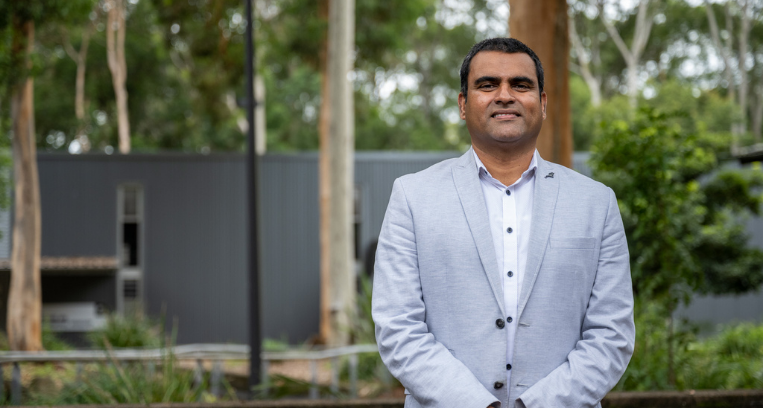Researcher Highlights
Building on experience
Associate Professor Thayaparan Gajendran
Emphasising the importance of effective communication, sustained innovation and seamless technology integration, Associate Professor Thayaparan Gajendran is seeking to create cultures of collaboration in project-based industries around the world.

At the heart of Gajendran's work is human response. At times, so is human pain. The Associate Professor conducts research in both the construction and disaster management fields, adopting a sociological lens to analyse their manifold structures, cultures and processes.
"In construction, I study small, medium and large organisations," he tells.
"In disaster management, on the other hand, I create, implement and evaluate risk reduction and mitigation programs to accelerate public preparedness and/or recovery."
"All of these efforts are evidence-based and serve to help deliver better outcomes and services for people."
Though at a "crossroads" in terms of how he plans to bridge the two together, Gajendran concedes construction and disaster management have more in common than most might otherwise think. Taking the nexus of training, teaching and research "very seriously," the multilinguist suggests the seemingly disparate areas also share a handful of applied skills and concepts.
"They impact significantly on communities and the economy as well," he affirms.
"Understanding their interactions will lead to an improved, more nuanced understanding of theory and practice."
Inform and transform
Gajendran worked in construction before moving to academia, signing up for an industry-embedded role following the completion of his undergraduate science degree at Sri Lanka's University of Moratuwa in 1995.
"My job back then was to look at risk profiling and write feasibility reports for consultants," he recalls.
"A few years later, I started and finished a Post Graduate Diploma in Management at the University of Jayewardenepura."
Keen to pursue research further afield, Gajendran went on to undertake a Masters in Facilities Management at the National University of Singapore in 1998. Another feather in his cap, the scholarship-funded study sought to explore "integrated approaches" to building performance measurements in the Asia-Pacific region.
"We assessed a range of properties, such as indoor air quality, thermal comfort, safety and security," he illuminates.
"Exhausting this data, we then produced an index, which can be used universally to understand how well a facility is working or not working."
"I continued in a research position after receiving my award in 2001, part of the team of industry and government bodies to design a $1 million productivity benchmarking system for construction businesses."
Comprehending the complex
Gajendran relocated to Australia in 2002, electing to examine the industry's uptake and integration of Information Communication Technologies (ICTs) as a PhD student at the University of Newcastle.
"I chose a complicated subject," he admits.
"It's very hard to agree on a definition of culture and what it means for construction."
"There is the metaphorical view, for example, which sees it as something that cannot be controlled or modified – people are culture."
"There is also the variable view, which sees it as something that can be measured and quantified."
Looking to apply an all-encompassing "conceptual framework" to existing management processes within project organisations, Gajendran merged the two paradigms. The findings, he divulges, were "quite clear."
"There are a number of stages where culture evolves," he shares.
"However, half the time, the 'assimilation' one, which comes before operations and the 'closing up period' and after a plan's inception, is ignored."
"This is a critical oversight."
"From the beginning, it is vital that stakeholders come together to understand the technology they are adopting and trying to incorporate."
Up-to-date and up to scratch
Gajendran has since continued strengthening ties between innovation and construction, spearheading a handful of cutting-edge research endeavours in the Hunter. Hoping to dispel widespread belief in a "lacklustre" industry, the Centre for Interdisciplinary Built Environment Research affiliate is duly looking for ways to think outside of the box.
"As a whole, we've been criticised for many things," he comments.
"Some governments and businesses suppose we too often stick to tradition and aren't productive enough."
"So it's important we try to understand how these professionals consider and talk about innovation – a term that is regularly ill-defined in certain contexts."
Seeking to do just that, Gajendran, along with Professor Peter Davies, will analyse five years' worth of metadata from the Australian Institute of Building. The prolific publisher is also set to explore the "dynamic capabilities" of construction organisations during the multiyear probe – how they scan their environments, reconfigure existing resources and change internal cultures to stay competitive.
"This work has never been done before," he reveals.
"It's quite exciting."
Not slowing down anytime soon, Gajendran is simultaneously in the process of conducting the same sort of research in Tasmania with Associate Professor Graham Brewer.
"I'll be collaborating with its Construction Industry Board," he discloses.
"This project will mostly be about innovation in small and medium enterprises."
At the ready
Believing project governance in disaster situations is "equally as important," Gajendran is additionally applying and transforming his own skills to this newer area of study. Together with two PhD candidates, the former 'Master of Disaster Preparedness and Reconstruction program convenor' will be reviewing the "best ways" to communicate risks.
"One will look at this specifically in a Ghanaian context, where there are informal settlements of people, while the other will look at it from an Australian context" he asserts.
The University of Newcastle acknowledges the traditional custodians of the lands within our footprint areas: Awabakal, Darkinjung, Biripai, Worimi, Wonnarua, and Eora Nations. We also pay respect to the wisdom of our Elders past and present.